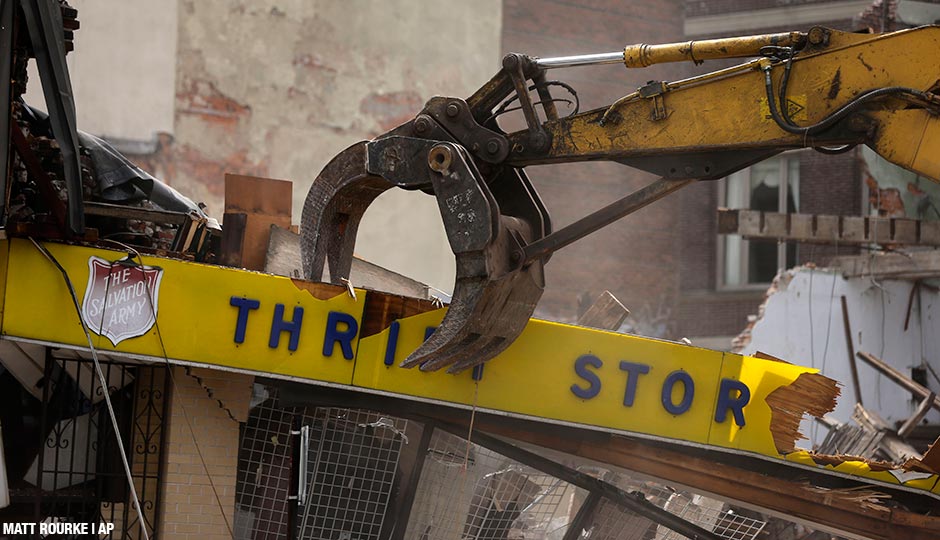Jury Selection for Salvation Army Collapse Trial to Begin Today

The remaining structure of the Salvation Army thrift store being demolished in June 2013. Photograph by Matt Rourke/AP
Starting this morning, a judge and teams of lawyers will begin to winnow a pool of potential jurors in the Salvation Army building collapse case.
The 12 people who are eventually chosen will help decide who will compensate the six victims and 13 survivors of the June 5, 2013, incident, in which a brick wall under demolition crashed through the roof of the Salvation Army thrift store at 22nd and Market streets.
Survivors and families of the victims are suing multiple parties, including Richard Basciano, whose company owned the building that collapsed while undergoing demolition; Center City architect Plato Marinakos, whom Basciano’s company hired to oversee the demolition; demolition contractor Griffin Campbell; excavator operator Sean Benschop; and the Salvation Army.
The 120 prospective jurors will first fill out a questionnaire designed to identify those who would be unable to serve for an extended period of time or who feel they would be not be able to judge the case with an open mind, according to the Inquirer. Once the pool is narrowed down, lawyers will individually interview the remaining prospects.
Selecting a jury could take weeks, so it could be a while before the trial actually begins. When it does, it will be split into two stages: the first will attempt to determine who, if anyone, is liable for the Salvation Army collapse, while the second will assess damages.
In 2015, a Philadelphia grand jury found Campbell guilty of six counts of involuntary manslaughter and multiple counts of reckless endangerment. Benschop, who pleaded guilty to involuntary manslaughter and reckless endangerment, was also found guilty. Campbell was sentenced to 15 to 30 years in prison, while Benschop was sentenced to seven and a half to 15 years.
Nancy Winkler, former Philadelphia city treasurer and mother of Anne Bryan, who died in the collapse, said the collapse was “no accident,” but the “predictable result of a series of choices that were made and not made.”
In June, Philadelphia magazine’s Steve Volk reported how a lack of funding and resources at L&I led to the collapse and many others, but a provision in state law prevents L&I itself from being sued, according to the Inquirer, as a city worker was not directly tied to the collapse.
Still, Winkler and others have criticized Marinakos and Basciano for allowing Campbell to oversee the project, as his lack of experience for such a demolition was so blatant that he allegedly paid Marinakos a $5,000 kickback to land the contract, though Marinakos denies that claim.
Follow @ClaireSasko on Twitter.


